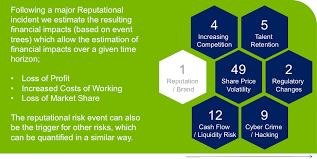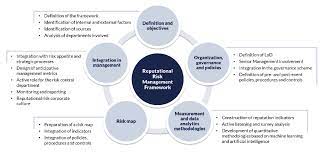Table of Contents
ToggleEvery business owner knows the importance of having a good reputation. After all, it’s what makes customers trust you and want to do business with you. However, managing your reputation can be a tricky task, as there are always potential risks lurking around the corner that could negatively impact your business. This is where reputation risk management comes in. With an effective risk management system in place, businesses can mitigate and monitor any potential risks that may threaten their reputational integrity. In this article, we will discuss what is reputation risk management and how it can benefit your business. Let’s get started!
What Is Reputational Risk?
Reputational risk is the potential for a business or individual to suffer reputational damage due to an event or series of events. This type of risk can arise from internal factors, such as poor management decisions, or external factors, such as negative media coverage. Reputational risk can be both costly and damaging to a company’s image and long-term success. As a result, it is important for businesses to have measures in place to prevent and manage any reputational risks that may arise. Such measures might include regular monitoring of the brand’s online presence, engaging with customers and responding quickly to any negative feedback, as well as creating crisis management plans in case of an unforeseen event. By taking proactive steps to address potential reputational risks, businesses can protect their reputation and ensure their continued success in the future.
What Is Reputation Risk Management?
Reputation risk management is the process of identifying, assessing, and mitigating risks to a company’s reputation. It requires an in-depth understanding of a company’s goals, values, and public perception, as well as an analysis of potential risks that may arise over time. Companies can use reputation risk management to create strategies for proactively addressing issues before they become damaging to the brand.
Types of Reputational Risk
Reputational risk comes in all shapes and sizes, and can be caused by a variety of factors. The most common types of reputational risk include:
1. Financial Risk – this is the risk associated with financial losses due to mismanagement or poor investments.
2. Regulatory Risk – this is the risk associated with non-compliance with applicable laws and regulations.
3. Operational Risk – this is the risk associated with operational failures such as supply chain disruption or data breaches.
4. Reputation Risk – this is the risk associated with negative public perceptions resulting from events or actions that could damage a company’s reputation in the eyes of customers, investors, employees and other stakeholders.
5. Strategic Risk – this is the risk associated with strategic decisions that may have long-term implications for a company’s success or failure.
By proactively managing these risks, companies can protect their brand image and maintain a positive reputation in their industry and beyond.
Strategic Risks
Strategic risks are risks associated with decisions made by a company that can have long-term impacts on the success or failure of the business. These risks can range from strategic missteps to potential investments and partnerships that may not pay off. Companies must be aware of these potential pitfalls and take steps to mitigate them. This can include conducting thorough due diligence before committing to any large investments or forming partnerships, as well as carefully monitoring key performance indicators and market trends.
Operational Risks
Operational risks refer to the risks associated with everyday operations of a business. This type of risk can come from a variety of sources, including human error, technological malfunctions and natural disasters. Companies must take steps to identify and mitigate these risks in order to protect their bottom line. For example, companies should invest in robust backup systems in order to ensure that critical data is backed up regularly, as well as consider insurance policies which will buffer them from losses due to natural disasters or other unforeseen events.
Business Model Risks
Business model risks refer to the potential for a company’s business model to fail or become obsolete. This type of risk can result from changing market conditions, new competitors entering the space, or shifts in consumer preferences and buying habits. Companies must take steps to identify and address these risks in order to remain competitive. For example, companies should have contingency plans in place to pivot their business models when necessary and keep an eye on emerging trends and technologies.
Social Media Posts
Social media has become an increasingly important part of how businesses manage their reputation and interact with customers. As such, it’s important to ensure that all posts on social media platforms are professional, accurate, and appropriate. Social media posts should be carefully planned in advance and checked for accuracy before they are published. Companies should also avoid posting anything and remove Glassdoor reviews that are controversial or offensive, as this could damage their reputation and alienate potential customers.
Senior Executives
Senior Executives are responsible for the day-to-day operations of a company and their decisions often have long-term implications. As such, they must be held to the highest standards when it comes to their professional conduct. Senior executives should always represent their organization in a positive light, display strong leadership skills and ethical decision making, and ensure that all decisions are in line with the company’s objectives.
Potential Risks from Business Partners
Business partners can be a great asset to a business, providing access to new markets and resources. However, there are potential risks associated with relying on business partners. For example, if the partner does not meet their obligations or fails to deliver on their promises, it could reflect badly on your company’s reputation and credibility. In addition, there may be conflicts of interest between the two companies that could lead to legal disputes or financial losses.
In late 2022, Shein made a commitment to pledge $15 million to improve standards at its supplier and manufacturing warehouses.
External Link: https://www.theguardian.com/business/2022/dec/05/shein-admits-working-hour-breaches-and-pledges-12m-to-improve-sites
Potential Threats from Search Engines
Search engines are a powerful tool for businesses to reach their target audiences and promote their products or services. However, there can be potential threats associated with this form of marketing. For example, search engines can make it easier for competitors to find information about your company’s products and services or even copy them. Furthermore, if a customer has a negative experience with your brand, they may leave a bad review online which could significantly damage your reputation.
Understanding the Impact of Reputation Risk on Your Business
Reputation risk management is an important component of any business, as it can have a significant impact on your overall success. Reputation risk occurs when a company’s reputation is damaged by negative reviews, inaccurate information, or other external factors. This can lead to reduced sales and customer loyalty, decreased stock value, and even brand damage. As such, it is critical to understand the potential risks associated with reputation and how they can affect your business.
Negative Impact on Your Customer Base
When reputation risk negatively impacts your customer base, the consequences can be severe. Customers may stop doing business with you, or even worse, spread negative reviews and stories about their experience with your company. To mitigate this risk and protect your brand, it is essential to respond quickly and appropriately to any complaints that arise. This should include a swift apology for the customer’s experience, as well as an effort to understand what went wrong and how it can be rectified.
Impact on Core Values and Potential Customers
The impact of reputation risk on core values and potential customers can be significant. Negative reviews or stories about a company’s services or products can cause potential customers to think twice before doing business with the company. This can lead to a decrease in sales, and if not addressed quickly and appropriately, it can also damage the company’s brand image and its core values.
The Benefits of an Effective Reputation Risk Management System
An effective reputation risk management system is essential for any business that wants to protect its brand and maintain customer loyalty. By monitoring customer reviews and feedback, businesses can identify areas of improvement and address potential issues before they become major problems. Furthermore, a good reputation risk management system can help businesses improve their customer service by quickly responding to complaints or inquiries.
A Stronger and More Resilient Reputation Structure
A strong and resilient reputation structure is essential for businesses to protect their brand and maintain customer loyalty. This can be achieved through a robust reputation risk management system that identifies potential risks before they occur and takes preventative measures to minimize any damage. Companies should also respond quickly to customer feedback and inquiries in order to build trust with customers and create a positive image for the business.
Increased Efficiency in Business Decisions and Operations
Increased efficiency in business decisions and operations is critical for any organization’s success. By streamlining processes and making informed decisions, organizations can reduce costs, increase productivity, and improve customer satisfaction. This can be achieved through the implementation of a well-defined risk management system that identifies potential risks and takes measures to mitigate them.
Developing a Plan to Mitigate and Monitor Reputational Risk
Reputational risk management is an important part of any business. It includes developing a plan to identify and mitigate potential reputational risks and establish systems for monitoring them on an ongoing basis. Companies should begin by assessing their current reputation, identifying the key stakeholders, and conducting research into the public perception of their brand. They should also develop a clear strategy for handling sensitive issues that may arise, as well as create a crisis management plan in case of any negative publicity.
Assessing the Potential Risks Involved
When assessing potential reputational risks, companies should consider both internal and external factors. Internally, companies should analyze their current brand identity and reputation, identify any potential legal issues that could cause harm to the reputation of the company, and review existing policies related to risk management. Externally, businesses should assess their competitive environment, evaluate public perception of their brand through research and data analytics, and understand potential risks associated with emerging technologies.
Designing a Comprehensive Risk Management Strategy
Designing a comprehensive risk management strategy is essential for businesses to protect their reputation. Companies should first create a clear set of policies and procedures that define the expectations for how potential reputational risks should be managed. This includes setting up systems for monitoring customer feedback, identifying trends in customer behavior, and responding quickly to any negative incidents.
Implementing a Reputational Risk Management Program
Implementing a reputational risk management program is essential for businesses to protect their reputation. Companies should start by creating a comprehensive plan that outlines the policies and procedures for managing potential risks. This includes establishing systems for monitoring customer feedback, identifying trends in customer behavior, and responding quickly to any negative incidents.


